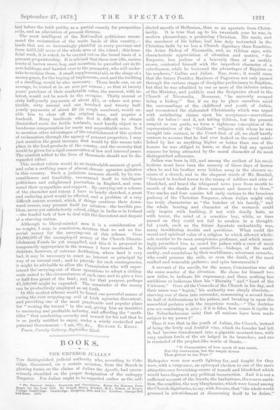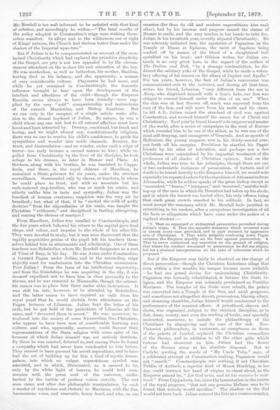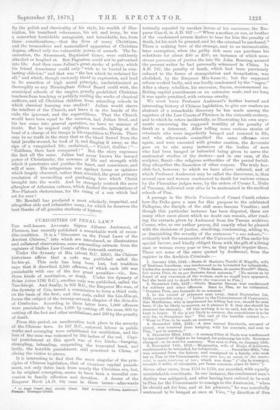BOOK S.
THE EMPEROR JULIAN.* Tim distinguished judicial authority who, according to Cole- ridge, discoursed, on a certain occasion, from the Bench in glowing terms on the claims of Julian the Apostle, had uncon- sciously stumbled on the proper designation of the unhappy Emperor. For Julian ought to be regarded rather as the self-
* 7916 Reirerer Julian r Paganism and Chrisiiisniig. Bring the Huirean Prize Emmy for the Year Mil. By Gerald Henry Eendall, M.A., Fellow of Trinity College, Cambridge. Cambridge ; Welton, Bell, and co. Loudon ; ueorgo Bell and Bens, 1879. elected apostle of Hellenism, than as an apostate from Christ- ianity. It is true that up to his tasentieth year he was, in modern phraseology, a professing Christian. His uncle, and. the murderer of his father, had him duly instructed in the Christian faith by no less a Church dignitary than Eusebius, the Arian Bishop of Nicomedia, and, as Gibbon says, with characteristic appreciation of situation and motive, "the Emperor, less jealous of a heavenly than of an earthly crown, contented himself with the imperfect character of a catechumen, while he bestowed the advantages of Baptism on. his nephews," Gallus and Julian. Nay, more ; it would seem that the future Pontifex Maximus of Paganism not only passed. through the various stages of discipline preliminary to Baptism,. but that he was admitted. to one or more of the inferior orders of the Ministry, and publicly read the Scriptures aloud in the Church of Nicomedia. Moreover, "he narrowly escaped being a bishop." But if we try to place ourselves amid the surroundings of the childhood and youth of Julian, and reconstruct the elaborated Christianity which was urged with unfaltering claims upon his acceptance—marvellous milk for babes h—and if, not taking Gibbon, but the present essayist as our guide, we form a righteous conception of the representatives of the " Galilean " religion with whom he was brought into contact, in the Court first of all, we shall hardly. venture to assume that he had over looked on the creed estab- lished by law as anything higher or better than one of the lessons he was obliged to learn, or that he had any special reasons for being attracted by the moral character of its most distinguished adherents.
Julian was born in 331, and among the earliest of his recol- lections must have been the memory of those days of horror when he and his brother were hidden away in the obscure re- cesses of .a church, and in the eloquent words of Mr. Rendall„ "listened in hushed terror to the tramp of soldiers and cries of bloodshed, and. heard the whispered news pass from mouth to mouth of the deaths of those nearest and dearest to them." Two uncles and four cousins fell early victims to the ferocious jealousy of the Christian Emperor, whom Julian might only too truly characterise as "the butcher of hie family," and the whole bearing anti character of the monarch could only inspire with loathing, if not with deadly hate, as with terror, the mind of a sensitive boy, while, as time passed on they could not fail to awaken in a thought- ful youth, such as the future Apostate undoubtedly was, many bewildering doubts and questions. What could the moral and spiritual value of a religion be which allowed. whole- sale murder to its most conspicuous professor, and which seem- ingly permitted him to crowd his palace with a crew of most despicable courtiers and councillors,—bishops, of the earth earthy, and scandalous by their worldliness ; miscreant eunuchs, who could procure the exile, or even the death, of the most exalted and venerable prelates ; and spies innumerable ?
A servant of the servile, for the nonce, Constantine was all the same master of the situation. He chose for himself two, new titles, to indicate his supremacy, and these nothing lesa ambitious or ludicrous than his " Eternity " and "Lord of the Universe." Over all the Councils of the Church in his day, and their name was "legion," his authority was simply absolute,— starving one of them into surrender, summoning a second from its hall of deliberations to his palace, and breaking in upon the assembled prelates with the imperious words,—" The doctrine you are combating is mine ; if it is false, how comes it (quite the Nebuchadnezzar vein) that all nations have beat made subject to my power ?"
Thus it was that in the youth of Julian, the Church, instead of being the lowly and fruitful vine, which its founder had left it, had become transformed into a gigantic mustard-tree, with very unclean fowls of the air lodged in its branches; and one is reminded of the prophet-like words of Dante,—
" 0 Constantine, of how much ill was cause, Not thy conversion, but the ample dower Thou gayest to the Pope !"
Bishoprics were now worth fighting for, and fought for they were, with a vengeance, an episcopal election to one of the more attractive seekaurnishing scenes of tumult and bloodshed which would have disgraced any political insurrection. And it is not a sufficient account of the frauds, the barbarisms, the coarse ambi- tion, the cruelties, the very blasphemies, which were found among the Church dignitaries, to say, with Jerome, that "the whole world. groaned in astonishment at discovering itself to be Arian." Mr. Rendall is too well informed to be satisfied with that kind of solution, and accordingly he writes,—" The fatal results of the policy adopted in Constantine's reign were making them- selves manifest. In alleys and in the wilderness, out of sight -of Kings' palaces, the Church had thriven better than under the shadow, of the Imperial upae-tree."
But if Alban is to be compassionated on account of the secu- larised Christianity which had replaced the primitive simplicity of the Gospel, our pity is not less appealed to by the circum- stances attendant on the in-door life and education of the boy. He was motherless, as well as fatherless, his mother, Basilina, having died in his infancy, and she, apparently, a woman -of very considerable culture. Playmates he had none, and while he yet remained in Constantinople, the domestic influence brought to bear upon the development of the intellect and affections of the child—though the Empress Eusebia seems always to have been friendly—were sup- plied by the very "arid" companionship and instructions of the eunuch Mardonius, and Bishop Eusebius. But we can only in the compass of a single article make allu- sion to the dismal boyhood of Julian. By nature, he was a child whom any one not lost to all natural affection must have loved and been attracted by. Dreamy, emotional, but frank and loving, and we might almost say, constitutionally religious, there was no one to receive his child's confidences, to guide his sympathies and wonder into noble channels. Reserve, dis- trust, and dissimulation—and no wonder, under such a reign of terror—too early became a second nature to him ; while re- pelled from Christianity by the lives of its disciples, he took refuge in his dreams, as later in Homer and Plato. At Thirteen, along with his brother, he was banished to Cappa- docia, and there, in the royal clateart of Macellum, he remained a State prisoner for six years, under the strictest surveillance. Surrounded only by slaves, or teachers, in whom he could place no trust, and with no associate but his rude-natured step-brother, who was so much his senior, and utterly unlike him in taste and sympathy, Julian was the loneliest of human creatures; suspicion was the very air he breathed ; but what of that, if he "sucked the milk of godly doctrine" from the stipereliaries of his uncle, was taught the Christian "evidences," and disciplined in fasting, almsgiving, and rearing the shrines of martyrs P
From Macellum, Julian was recalled to Constantinople, and the five years which followed his return to the capital gave final shape, and colour, and impulse to the whole of his after-life. They were devoted to study, but it was soon discovered that the rapidly acquisitive genius of the pupil left his teachers them- selves behind him in attainments and scholarship. One of these teachers was Hekebolius, whom Mr.Rendall designates as a sort of Vicar of Bray, in his day. He was Arian under Constantine, a forward Pagan under Julian, and in the succeeding reign abjectly sued for readmission into the Christian communion. Poor Julian From the fame of his intellectual superiority, and from the friendships he was acquiring in the city, it was , deemed expedient not to have him in Close proximity to the throne, and he was removed to Nieomedia, though the ostensi- ble reason was to place him there under abler instructors. It was still his fate, however, to be attended by Hekebolius, and the latter seems to have required an oath from his royal pupil that he would abstain from attendance on the Pagan lectures of Libanius. Julian kept the letter of his oath, but he got hold of the prelections of Libanius all the same, and "devoured them in secret," He was, moreover, in- troduced into the society of some Nicomedian Neo-Platonists, who appear to have been men of considerable learning and culture, and who, apparently, moreover, could flavour their representations of the State religion with some spice of the humour of which Julian himself was not entirely destitute. By these he was courted, deferred to, and among them he found a sympathy which had never been vouchsafed to him before. They seemed to have guessed his secret aspirations, and to have had the art of building up for him a kind of mystic dream- palace, into which no vulgar, superstitious symbol was admitted, and in which, illuminated, as it seemed to be, only by the white light of heaven, he could hold com- munion with the great soul of the universe, undis- turbed by the babble of profane voices outside. The end soon came, and after due philosophic manipulation, by such a master of mysticism and rhetoric as Maximus, with the fine, harmonious voice, and venerable, hoary head, and who, on one occasion (for thus do old and modern superstitions kiss each other), had by his incense and prayers caused the statue of Hecate to smile, and the very torches in her hands to take fire, Julian, in his twentieth year, secretly abjured Christianity. He was solemnly initiated into the mysteries of Paganism in the Temple of Diana at Ephesus, the taint of baptism being washed off by means of the blood of a slaughtered bull sprinkled on his head ; and Gibbon writes, for Julian cer- tainly is no very great hero, in the regard of the author of The Decline and Fall, "by a strange contradiction, he dis- dained the salutary yoke of the Gospel, while he made a volun- tary offering of his reason on the altars of Jupiter and Apollo." For ten years, however, the fact of Julian's conversion was communicated only to the initiated, and during all that time, writes his friend, Libanius, "very different from the ass in .sop, who disguised himself with a lion's hide, our lion was obliged to conceal himself under the akin of an ass." When the skin was at last thrown off, much was expected from the roar of the lion, and still more from his teeth and his claws.
In 361 AD:, Julian raised the standard of civil war against Consta,ntius, and avowed himself the sworn foe of Christ and Christianity. Next year he found himself sole eraperor and master of the world, after a series of campaigns in the west of Europe which revealed him to be one of the ablest, as he was one of the most self-denying, and courageous of Generals. And as apostle of Hellenism, the young emperor, now in his thirty-second year, put forth all his energies. Doubtless he startled his Pagan friends by his edict of toleration, and perhaps not a few Christians were scandalised by his impartial treatment of the professors of all shades of Christian opinion, And on the whole, Julian was true to his principles, though there are ono or two undeniable instances of persecution, of torture, and of death to be traced directly to the Emperor himself, we would note especially his repeated orders for the expulsion of Athanasius from Alexandria, while he seldom speaks of the great bishop except as "scoundrel," "knave," "intriguer," and "accursed;" and the wall- ing-up of the cave in which St. Domitius had taken up his abode, and in which the hermit was buried alive, his only offence being that such great crowds resorted to his solitude. In fact, we
must accept the summary which Mr. Rendall feels justified in submitting to his readers, after a scrupulous investigation of all the facts or allegations which have come under the notice of a vigilant student :— "1. That no organised or widespread persecution prevailed during Julian's reign. 2. That the sporadic instances which occurred were in almost every case provoked, and in part excused, by aggressive acts of Christians. 3. That while palpably condoning some Pagan excesses, the Emperor steadily set his face against persecution. 4. That he never authorised any execution on the ground of religion, that where his conduct amounted to persecution he did not abjure, but set a strained interpretation on the laws of toleration which he proposed."
But if the Emperor may fairly be absolved on the charge of direct persecution—though the Christian historians allege that even within a few months his temper became more irritable —he had one grand device for undermining Christianity. Paganism was formally rehabilitated, it became the State re- ligion, and the Emperor was solemnly proclaimed as Pontifex Maximus. The temples of the Gods were rebuilt, the palace was converted into a Temple of the Sun, and amid gorgeous, and sometimes not altogether decent, processions, blazing altars, and steaming shambles, Julian himself would condescend to the performance of the meanest offices. A priesthood, shaven and shorn, was organised, subject to the strictest discipline, as to diet, dress, society, and even the reading of books, and specially instructed, moreover, to imitate the philanthropy of the Christians by almsgiving and its care of the sick. Neo- Platonist philosophers, in vestments as sumptuous as those of the priests of Jezebel, replaced the Christian counsellors of the throne, and in addition to all the other gifts which fortune had showered on him, Julian had the flower of the Roman army at his absolute disposal. But as Carlyle, quoting the words of "My Uncle Toby," says, of a celebrated attempt at Constitution-making, Paganism would not "march." Constantinople was nothing, if not Christian. Publia, of Antioch, a superior kind of Manse Headrigg, in her day, could instruct her band of virgins to chant aloud, as the Emperor passed by, " Let God arise, and let his enemies be scat- tered." From Cappadocia, too, came the lamentation in the course of the royal progress, "that not one genuine Hallow was to be found, that nobody would sacrifice." The shadow on the dial would not turn back. Julian entered the lists as a controversialist.
By the polish and classicality of his style, his wealth of illus- tration, his trenchant vehemence, his wit and irony, he was a somewhat formidable antagonist, and formidable, too, from these considerations,—that the lives of many Christians, and the tremendous and materialised apparatus of Christian dogma, offered only too vulnerable points of assault. The In- carnation, the Atonement, Baptismal Grace, were ruthlessly attacked or laughed at. But Paganism could not be galvanised into life. And then came Julian's great stroke of policy, which his friend Ammianus could only "wish to be buried in ever- lasting oblivion," and that was "the law which he ordained for all," and which, though curiously timid in expression, and loud in its assertion of high moral principle, unchristiamised as thoroughly as any Birmingham School Board could wish, the municipal schools of the empire, penally prohibited Christian teachers from teaching or publicly reading the works of classical authors, and all Christian children from attending schools in which classical learning was studied ! julian would starve the intellect of the Church, and. leave it in the hands of the rude, the ignorant, and the superstitious. That the Church would have been equal to the occasion, had julian lived, and his law come into general operation, we have no manner of doubt. But he reigned only eighteen months, falling at the head of a charge of his troops in his expedition to Persia. There may be no truth in the story that as the blood flowed from the fatal javelin-wound, he took of it, and flinging it away, as the sign of a vanquished life, exclaimed,—.vii, Galikee !"— " Galilean, thou hast conquered ! " But the story expresses the fact all the same. Julian had never known the inward power of Christianity, the newness of life and strength with which it penetrates and purifies the heart, and conscience, and will of man. His antagonism was against forms or opinions which largely obscured, rather than revealed, the great primary revelation of reconciling and pardoning love which Christ brought into the world. And he strangely mistook the mere afterglow of Athenian culture, which flushed the speculations of Neo-Platonic rhetoricians, for the rising of a sun which had set for ever!
Mr. Rendall has produced a most scholarly, impartial, and altogether able and exhaustive essay, for which he deserves the best thanks of all genuine students of history..




































 Previous page
Previous page